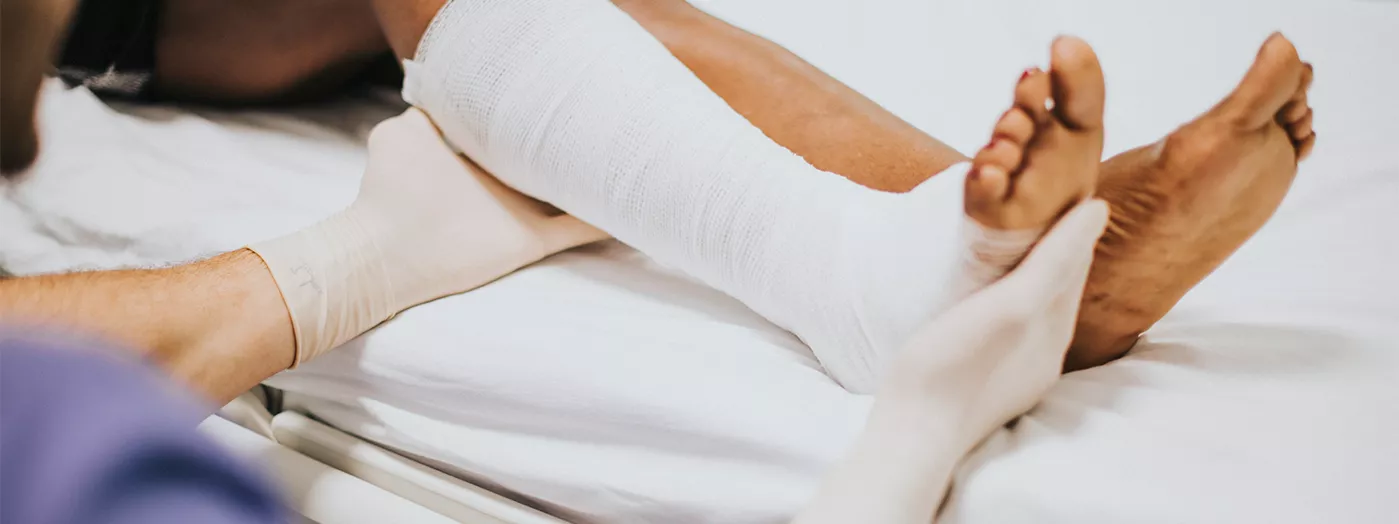Fractures are among the most frequently treated injuries in hospitals. A fracture occurs when a bone cracks or breaks due to a strong impact, fall, or some underlying condition that weakens the bone. The need for fracture treatment in Chennai is widespread, with cases ranging from minor breaks that only require a cast to complex injuries that need surgical intervention.
Chennai, known for its excellent healthcare infrastructure, offers a wide array of treatment options. The city’s hospitals are equipped with the latest technology, and its doctors are among the best in the country. Whether you’re seeking bone fracture treatment in Chennai or more specialized care such as spine fracture treatment in Chennai, you can expect high standards of medical care.
What is a Fracture?
A fracture is a medical condition where a bone is broken, cracked, or shattered due to excessive force, trauma, or underlying health conditions like osteoporosis. Fractures can range from minor hairline cracks to severe breaks that pierce the skin or shatter the bone into multiple pieces.
Types of Fracture Treatment in Chennai
Understanding the 8 different types of fractures in Chennai you’re dealing with is crucial for choosing the right treatment. There are many different kinds of fractures, each requiring a specific approach to healing. Here are some of the most frequently seen types:
- Simple Fractures: These are straightforward breaks where the bone remains aligned and doesn’t pierce the skin. They are relatively easy to treat and usually heal well with immobilization.
- Compound Fractures: These are more serious as the bone breaks through the skin, increasing the risk of infection. Treatment often involves surgery to clean the wound and fix the bone health.
- Greenstick Fractures: Common in children, these fractures occur when the bone bends and cracks but does not break completely. Children’s bones are softer and more flexible, which is why this type of fracture is more prevalent in younger patients.
- Comminuted Fractures: In these cases, the bone shatters into several pieces. Such fractures usually require surgical intervention to piece the bone back together and secure it with pins, plates, or screws.
- Spiral Fractures: Caused by a twisting force, this type of fracture spirals around the bone. It often occurs in sports-related injuries and requires careful realignment and stabilization.
- Oblique Fractures: These are slanted breaks that occur at an angle across the bone. Depending on the severity, they may require surgical or non-surgical treatment.
- Transverse Fractures: The fracture is horizontal across the bone and is typically caused by a direct blow or stress. Immobilization or surgery may be needed depending on the fracture’s alignment.
- Compression Fractures: These fractures occur when the bone is crushed, often affecting the spine. Spine fracture treatment in Chennai is particularly crucial in these cases to prevent long-term complications such as chronic pain or disability.
Each of these 8 different types of fractures presents its own challenges. The specific treatment required can vary greatly, which is why it’s important to consult with specialists who are experienced in fracture treatment in Chennai.
Causes of Fractures
Fractures can be caused by various factors, ranging from accidents to underlying health conditions. Understanding the cause of a fracture is important not just for treatment but also for prevention in the future. Common causes include:
- Accidents: Car accidents, falls, or other forms of trauma are the most common causes of fractures. The impact force can easily break bones, especially if they are subjected to a sudden, powerful blow.
- Sports Injuries: High-impact sports, such as football, basketball, and skiing, can lead to fractures. Athletes are particularly prone to fractures due to the physical demands of their sports.
- Osteoporosis: This is a condition that weakens bones, making them more prone to fractures even from minor stresses. It is particularly common in older adults.
- Overuse: Stress fractures can occur due to repetitive motion, often seen in runners or soldiers who undergo prolonged periods of physical activity. These fractures result from overuse and the inability of the bone to recover adequately between activities.
Identifying the cause can guide the treatment approach, making fracture treatment in Chennai not just about healing the current injury but also preventing future ones.
Diagnosis and Treatment
Proper diagnosis is crucial in determining the appropriate treatment for a fracture. The diagnostic process typically involves:
- X-rays: X-rays are the most common imaging technique used to confirm the presence of a fracture and to assess the extent of the injury.
- MRI or CT Scans: For more complex fractures or when soft tissue damage is suspected, an MRI or CT scan may be necessary. These imaging techniques provide a more detailed view of the injury, helping doctors plan the best course of treatment.
Once the fracture is diagnosed, the treatment options include:
- Casting: For simple fractures, immobilization with a cast is often sufficient to allow the bone to heal properly. The cast keeps the bone in place and prevents movement that could interfere with the healing process.
- Surgery: In cases of spine fracture treatment in Chennai or other complex fractures, surgery may be required. This could involve the use of metal pins, plates, or screws to hold the bone fragments together and ensure proper alignment as they heal.
- Physical Therapy: After the initial treatment, physical therapy is often necessary to restore strength, flexibility, and function to the affected area. This is especially important for more severe fractures or those that involve joints.
The quality of fracture treatment in Chennai can significantly affect recovery time and the likelihood of complications. This is why choosing the right hospital and medical team is so important.
Operation Procedure for Bone Fractures
Not all fractures require surgery some can heal with plaster, braces, or casts. However, when the bone is severely displaced, unstable, or affecting vital functions, surgery may be recommended.
During bone fracture treatment in Chennai, orthopedic surgeons may use advanced fixation methods such as:
- Plates and screws to hold the bone in place
- Intramedullary rods for long bone stabilization
- External fixation devices for complex or multiple fractures
The procedure is performed under anesthesia to ensure comfort. Most patients spend a short period in the hospital, where doctors monitor healing and manage pain. Thanks to modern surgical techniques, Fracture Repair Treatment in Chennai is safe and results in strong, stable bones.
Complications of Bone Fractures
Fractures can lead to several complications, particularly if not treated properly or promptly. Some potential complications include:
- Infection: This is a significant risk with compound fractures, where the bone breaks through the skin, exposing it to bacteria. Infection can complicate the healing process and may require additional treatment, such as antibiotics or even further surgery.
- Nerve Damage: Fractures that occur near nerves can lead to nerve damage, resulting in numbness, weakness, or even paralysis in severe cases.
- Nonunion: This occurs when a fracture fails to heal properly, leading to chronic pain and potentially requiring additional surgery to correct it.
- Arthritis: Fractures that extend into a joint can increase the risk of developing arthritis later in life. Proper alignment and stabilization during treatment are crucial to minimize this risk.
Hospitals specializing in bone fracture treatment in Chennai are equipped to handle these complications, ensuring that the patient receives comprehensive care from diagnosis through recovery.
Prevention of Fractures
While not all fractures can be prevented, certain measures can significantly reduce the risk:
- Calcium and Vitamin D Intake: Ensuring that you get enough calcium and vitamin D is essential for maintaining strong bones. This is particularly important for older adults who are more prone to osteoporosis.
- Regular Exercise: Weight-bearing exercises, such as walking, running, and strength training, can help maintain bone density and reduce the risk of fractures.
- Safety Measures: Wearing protective gear during sports and ensuring your home is free of hazards that could lead to falls are important preventive steps.
- Healthy Lifestyle: Avoiding smoking and excessive alcohol consumption can also help maintain bone health, reducing the likelihood of fractures.
By taking these steps, you can significantly lower your risk of fractures and the need for fracture treatment in Chennai.
Post-Surgery Care
After surgery, proper care ensures smooth recovery:
- Monitoring: Vital signs are observed post-anesthesia.
- Pain Management: Medications to alleviate discomfort.
- Immobilization: Casts, braces, or splints protect the area.
- Physiotherapy: Gentle exercises to prevent stiffness and improve mobility.
Regular follow-ups help detect and address complications early, ensuring effective recovery.
Healing Process for Fractures
- Immobilize the Injured Area
Prevent any movement of the fractured limb by using a splint or sling, ensuring it supports both the joint above and below the injury. Movement can worsen the fracture, increase pain, or lead to complications requiring more complex fracture treatment in Chennai.
- Control Bleeding and Swelling
If there is visible bleeding, apply gentle pressure with a clean cloth to minimize blood loss. Elevating the injured limb and applying a cold pack wrapped in a towel can help reduce swelling and discomfort without aggravating the fracture.
- Avoid Attempting to Straighten the Bone
Never try to realign or push back a deformed bone, as improper handling can damage nerves, blood vessels, or surrounding tissue. Instead, keep the limb in its current position and wait for professional medical assistance to perform safe and precise correction.
- Monitor for Shock
Watch for signs like rapid breathing, cold skin, or fainting, which may indicate shock—a serious medical emergency. Keeping the person calm and lying flat with their legs elevated can help maintain blood flow until trained professionals arrive.
- Seek Prompt Medical Attention
After administering initial care, immediate evaluation is essential to determine the extent of the injury and the appropriate course of fracture treatment in Chennai. Early intervention minimizes the risk of complications and promotes faster healing.







